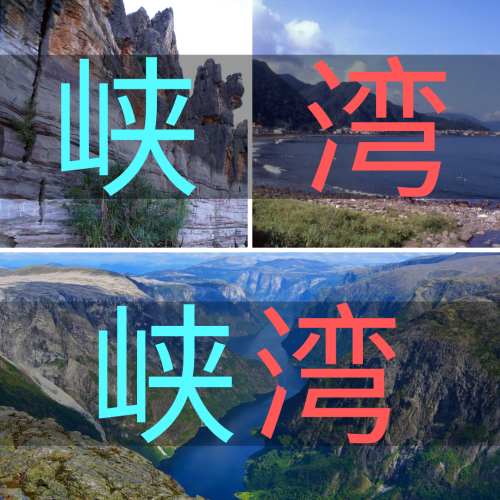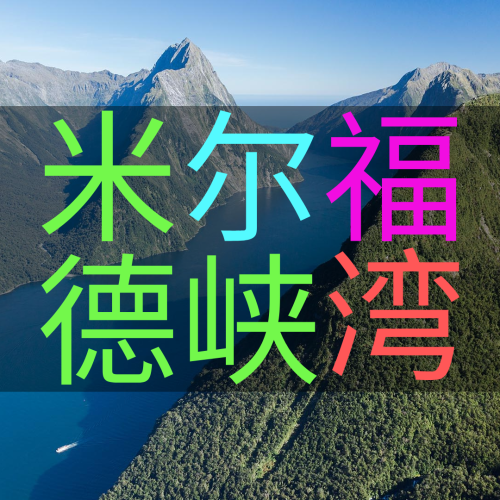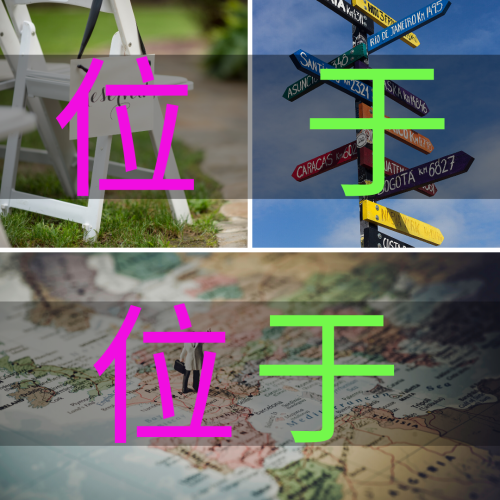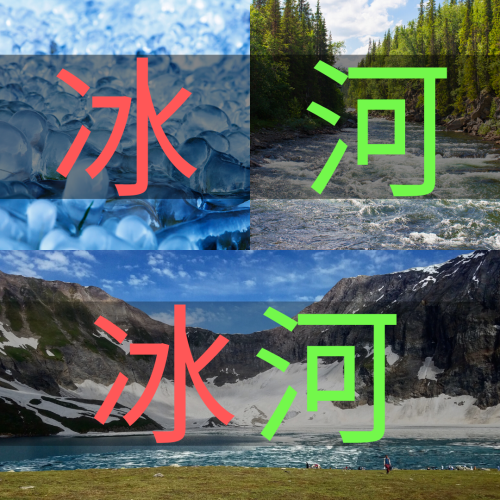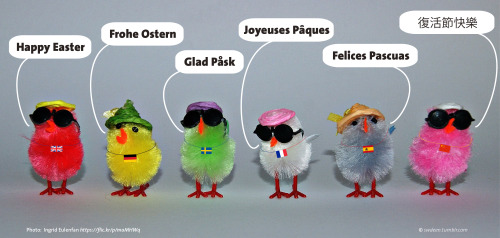#mandarin
米福尔德峡湾或称米佛峡湾是位于新西兰南岛西南部峡湾国家公园内的一处冰河地形。
米福尔德 mǐ fú ěr dé = Milford
峡湾 xiá wān = fjord
米佛mǐ fó = Milford
或称 huò chēng = also known as (HSK3)
位于wèi yú = to be located (位 mw for person HSK3)
新西兰xīn xī lán = New Zealand
南岛 nán dǎo = southern island
国家公园 guó jiā gōng yuán = national park
处 chǔ = measure word for location
冰河 bīng hé = glacier(河 HSK3)
地形 dì xíng = topography
Post link
艺 = yì = skill, art
So there’s two sides to this character — skills and arts — but they’re somewhat similar related.
艺术 (yì shù) is art itself, so 艺人 (yì rén) is a performing artist, 艺术品 (yì shù pǐn) is a work of art and 艺术节 (yì shù jié) is an arts festival.
When you move over to the skills, you get words like 厨艺 (chú yì) cooking skills, or 园艺 (yuán yì) gardening… but in truth, aren’t those a kind of art too?With a bit of 才艺 (cái yì) talent and some perseverance, you can 学艺 (xué yì) learn any skill or art. :)
Post link
»Easter« has its roots in the Latin »Pascha« and Hebrew »Pesah« and is the celebration period of the resurrection of Jesus.
While the Swedish, French and Spanish word for Easter are clearly referring to the origin in the Latin and Hebrew root, the German and English words trace back to a different origin.
There are several theories that can be found and—as so often—no one can tell which theory is the right one.
- It could derive from the old Germanic word »Austro« which stands for a »red dawn/aurora«. This bright red light has a symbolic meaning because the empty grave of Jesus has been found and in this theory »Easter« is a symbol of the resurrection.
- Another theory is that »Easter« describes the direction »East« (Germ.: Ost), where the dawn takes place. Many Christians were baptized during dawn on Easter morning. This ceremony was called »Ostaurn«.
- A common but probably false explanation is that the »Ostern« and »Easter« celebration replaced a pagan spring tradition in honor of the Anglo-Saxon goddess Ostara.
Here you can learn the pronunciation of the examples in the pic:
Happy Easter (English),Frohe Ostern (German),Glad Påsk (Swedish),Joyeuses Pâques (French),Felices Pascuas (Spanish)
The Local has collected nine traditions how the Germans celebrate Easter.
Ref.: http://pagewizz.com/frohe-ostern-in-allen-sprachen/
Photo: Ingrid Eulenfan https://flic.kr/p/maMHWq
Post link
Song: 《左手陪右手》by 雷拉 (Layla Sania)
繁体 - 简体 - en
人分 - 人分 [rén fèn] - person-portion
失眠 - 失眠 [shī mián] - insomnia; sleeplessness
浮沉 - 浮沉 [fú chén] - to drift along; to sink & emerge
墨 - 墨 [mò] - ink
子夜 - 子夜 [zǐ yè] - midnight
瓦解 - 瓦解 [wǎ jiě] - to collapse, to crumble
翻越 - 翻越 [fān yuè] - to surmount, to transcend
季節 - 季节 [jì jié] - time, period, season
漸漸 - 渐渐 [jiàn jiàn] - gradually
出走 - 出走 [chū zǒu] - to run away, to leave home
處在 - 处在 [chǔ zài] - to be situated in
搖晃 - 摇晃 [yáo huàng] - to rock, to sway, to shack
折疊 - 折叠 [zhé dié] - to fold
蜿蜒 - 蜿蜒 [wān yán] - to wriggle, winding
見證 - 见证 [jiàn zhèng] - witness, testimony, evidence
轉捩 - 转捩 [zhuǎn liè] - to turn
征服 - 征服 [zhēng fú] - to conquer, to subdue
範圍 - 范围 [fàn wéi] - to range, to scope, to limite
捍衛 - 捍卫 [hàn wèi] - to defend, to guard, to protect
無須 - 无须 [wú xū] - needlessly
難解 - 难解 [nán jiě] - hard to solve, hard to undo
結 - 结 [jié] - knot, bind
本質 - 本质 [běn zhì] - essence, nature
蔚藍 - 蔚蓝 [wèi lán] - azure, sky blue
仍 - 仍 [réng] - still, yet, to remain
期盼 - 期盼 [qī pàn] - to anticipate, to look forward to
盞 - 盏 [zhǎn] - classifier for lamps










Fruit trees are fruiting!
All these trees I’ve grafted or rooted myself, starting with bare rootstock or a cutting. Many of these trees I’ve put on multiple varieties. Some have more than half a dozen or more different varieties on one tree!
Since we don’t own land, we grow our trees in containers. They all started out in 1 gallon pots and now most are in 15 gallon containers. I don’t plan on potting up further but we are hopeful we will plant many of these trees in the ground when we buy a place soon.
We’ve got apple, Asian pear, plum, nectarine, peach, grapefruit, mandarin, pineapple guava, fig, pomegranate and more.
No fruit yet on the cherry or European Pear trees. Maybe next year!
The 24 solar term calendar was used in ancient China to govern agricultural arrangements and farming activities. The terms reflect changes in climate and other natural phenomena that used to play important roles in clothing, food, housing, and transportation. They still influence some Chinese customs and culinary practices.
The Earth orbits around the Sun along an elliptical path. Its axis is not perpendicular to the orbit but is tilted at about 23 degrees. The solar terms are evenly spread along theapparentpaththe Sun follows, which is known as ecliptic, and form a cycle that corresponds to one yearexactly.
The system includes 12 major(sectional)and 12 minor(middle)solar terms. Each of them lasts around 15 days. They reflect the change of seasons (Beginning of Spring), the variation of the sun’s altitude (Summer solstice), the changes of temperature (Limit of Heat), the type and intensity of precipitation (White Dew), the maturity and harvest time of crops (Grain in Ear), and insect activity (Awakening of Insects).
History
During the Spring and Autumn period (770-476 BCE) of the Zhou dynasty, the Chinese established two major solar terms: 日南至 (rìnánzhì, “sun south most”) and 日北至 (rìběizhì, “sun north most”).
At the end of the Warring States period (475-221 BCE), eight solar terms were in use. They represented the four seasons and solstices.
The rest of the terms were introduced during the Han dynasty (206 BCE-24 CE), which is most terms refer to the climate of its capitalXi’an.
Solar terms

- 立春 (lìchūn): February 4, Beginning of Spring (though only in the extreme south)
- 雨水 (yǔshuǐ): February 19, Rain Water (increase of rainfall)
- 惊蛰 (jīngzhé): March 5, Awakening of Insects (Thunder begins and hibernating insects wake up.)
- 春分 (chūnfēn): March 20, Spring Equinox (equal length of day and night)
- 清明 (qīngmíng): April 4, Pure Brightness (The weather becomes noticeably warmer. It is clear and bright, although not in the south)
- 谷雨 (gǔyǔ): April 19, Grain Rain (The early crops show their shoots.)
- 立夏 (lìxià): May 5, Beginning of Summer (in southern China)
- 小满 (xiǎomǎn): May 21, Grain Buds (The seeds of summer crops begin to become plump, but are not yet ripe.)
- 芒种 (mángzhǒng): June 6, Grain in Ear (The wheat becomes ripe, and the summer planting starts in southern China.)
- 夏至 (xiàzhì): June 21, Summer Solstice (The daytime is the longest and the nighttime is the shortest of the year.)
- 小暑 (xiǎoshǔ): July 7, Minor Heat (beginning of the hottest period)
- 大暑 (dàshǔ): July 23, Major Heat (The duration of the sunshine is the longest, the rainfall is the greatest, and the thunderstorms are the most frequent in some parts of northern China.)
- 立秋 (lìqiū): August 7, Beginning of Autumn (Nowhere is this true.)
- 处暑 (chùshǔ): August 23, End of Heat (end of the hot summer)
- 白露 (báilù): September 7, White Dew (The transition from summer to autumn. The temperature drops sharply, and the autumn rains come.)
- 秋分 (qiūfēn): September 23, Autumn Equinox (equal length of day and night)
- 寒露 (hánlù): October 8, Cold Dew (The weather becomes cold enough to reach dew point, but not cold enough to reach frost point.)
- 霜降 (shuāngjiàng): October 23, Frost’s Descent (The weather becomes cold and frost begins to form in North China.)
- 立冬 (lìdōng): November 7, Beginning of Winter (true of northern China)
- 小雪 (xiǎoxuě): November 22, Minor Snow (Snow begins to fall, and the weather becomes cold.)
- 大雪 (dàxuě): December 7, Major Snow (It snows heavily for the first time in the north.)
- 冬至 (dōngzhì): December 22, Winter Solstice (The daytime is the shortest and the nighttime is the longest of the year.)
- 小寒 (xiǎohán): January 5, Minor Cold (The weather rapidly reaches its coldest.)
- 大寒 (dàhán): January 20, Major Cold (the coldest time of the year.)
* There could be 1-2 day differences regarding the Gregorian calendar. All dates are based on the Northern Hemisphere.
Quando você começa a estudar um novo idioma e vai logo procurando aprender palavras importantes…
Post link
Idiom
一日三秋
(yīrìsānqiū)
one day apart seems like three years—miss sb. very much
The difference between 感冒and生病
感冒
(gǎnmào)
common cold
Ex.) 我感冒了。
(Wǒ gǎnmàole)
I caught a cold.
生病
(shēngbìng)
fall ill, be sick
Ex.) 我听说你生病了。
(Wǒ tīngshuō nǐ shēngbìngle)
I heard you were ill.
浪费时间
(làngfèi shíjiān)
waste time; fritter away one’s time

I had been thinking about how wordle works well for english because it has consonant clusters and a wide variety of possible syllables that make it interesting but also narrow-down-able, whereas mandarin decidedly Does Not. I guess to get around that this uses four character phrases. Tricky but at least you might learn a new chengyu regardless :)
适应 (適應) shìyìng and 习惯 (習慣) xíguàn can both be used to describe adapting to a new things, but they’re not the same!
适应 (適應) shìyìng
V. to adapt, to fit, to suit. This can be about something’s compatibility with a system, a sort of “coming into alignment with” maybe.
适应需要
shìyìng xūyào
meet the requirments (say on a job app)你的思想必须适应变化了的情况。
nǐ de sīxiǎng bìxū shìyìng biànhuàle de qíngkuàng
You need to adapt your thinking to the changed circumstance.
习惯 (習慣) xíguàn
N. habit, custom. (不良习惯 - bad habit) nothing tricky here
V. to accustom to, to get used to. For me this kind of “adapting” feels much more about personal contexts. For example when I was studying abroad people would ask if I had 习惯ed to the city, to the food eg.
他习惯早起。
tā xíguàn zǎoqǐ
He’s used to getting up early.我已经习惯了纽约的生活节奏。
wǒ yǐjīng xíguànle niǔyuē de shēnghuó jiézòu
I’ve already gotten used to the pace of life in New York.
As always the more times you encounter them they will naturally disambiguate themselves, but hopefully this gets you going!
开斋节快乐!kāi zhāi jié kuài lè! Happy Eid!
斋月
zhāi yuè
Ramadan (occasionally 拉马丹 lā mǎ dān)
封斋
fēng zhāi
to fast (she says it’s only for Muslims, but I think she means is it has religious connotations, since it can also be applied to Lent)
This account does a lot of daily life scenarios, sometimes she’ll interview a friend. This Ramadan explainer is a little over-simplified but has some good vocab! (also to note, yes the Hui minority is Muslim, but there are regional differences, and there are also non-Hui Muslim Chinese. for more on ethnic minority definition mess see)
After “After Babel” - Heichi magazine
黑齿 Heichi is a bilingual Chinese-English online magazine, “Heichi neither claims an origin nor pursues lost traditions; it considers alternative perspectives on art’s relation to politics and society, spirituality and technology, the beautiful and the grotesque.”
It’s easy to toggle between the two version, so handy for checking comprehension. Once you get advanced-ish it’s easy to get mired in HSK vocab lists but feel like you /still/ can’t read anything you care about! At some point you have to aim your vocab acquisition for yourself !(•̀ᴗ•́)و ̑̑
Chinese Zero To Hero made a free short series on famous Chinese poems! They’re from the Tang Dynasty & in Classical Chinese, so this is a nice way to get some guidance (if you’d like something more contemporary they also did a songs series)
Both 東西 (东西) dōngxī and 事兒 (事儿) shì’r translate to “thing,” but the things they apply to don’t actually overlap much! After awhile this is the sort of thing that just “sounds weird” if you mix them up, but until then here’s some tips to keep them separate~
Measure Words 量词
- for 东西 the measure word is 个
- for 事儿 the measure word is 件
Concrete Things/Experiences - 东西
东西 is generally for actual objects, but also extends to abstract things that could be touchable, sorta? hard to explain but let’s try examples
哎呀 那个东西我放在哪儿?
Āiyā nàgè dōngxī wǒ fàng zài nǎ'er?
Where’d I put that thing??
maybe the most common use of dongxi, as the equivalent for “thingy/thingamabob” when you forget the word
今天社会上有很多美好的东西,也有不少丑恶的东西。
jīntiān shèhuì shàng yǒu hěnduō měihǎo de dōngxī, yěyǒu bù shǎo chǒu'è de dōngxī.
There are many nice things as well as ugly things in today’s society.
the “nice things” mentioned here could be enumerated, you could say “the internet” or “air conditioning,” bad “things” could be “the rising cost of housing;” even as abstract nouns they are nouns. What they are not is…
Tasks/Abstract Happenings - 事儿
事儿 applies to tasks, happenings, situations. This is why “有事儿吗?” is “Did something happen/are you ok?” not “Do you have a thing?” It’s also why as a polite way to get out of something you can “不好意思,已经有事儿” as in you already have a commitment/thing to do.
对不起,忘了这件事儿了。
duìbùqǐ, wàngle zhè jiàn shìrle.
Sorry, I forgot about that. (say if your supervisor asked you to do something)
今天我忙死了!得做很多事儿!
jīntiān wǒ máng sǐle! Děi zuò hěnduō shì er!
I’m so busy today! I have to do so many things!
现在那件事还好吗?
xiànzài nà jiàn shì hái hǎo ma?
Did the matter get sorted out?
I hope that separated them out decently. The idea for this post came from flipping through 汉语常用近义词语辨析 Common Chinese Synonyms Discriminated if this is something you’d like more of (or hmu) !(•̀ᴗ•́)و ̑̑
How to say personal pronouns in Chinese language “I,you,he,she..” and how to make a simple sentence
Lesson 1
Why does China use the Lunar Calendar?

Have you ever wondered about the difference of the Gregorian calendar and the Lunar calendar when learning Chinese online? In China, we use two calendars, the Gregorian one that we are all used to and a Lunar calendar, which at times can lead to some confusion. How does it work? The dates on the Lunar calendar change every year making it hard to keep up with. Contrary to it’s name, the Lunar…
Things you need to know about China’s geography

When talking about China and Chinese Culture, what will come to your mind first? Its long history, tasty food, or the big cities like Beijing or Shanghai? But, you might have missed the fact that, geographical speaking, China is also one of the largest countries in the world. How large is it? What are some fun facts about its geographic features? This article will introduce some to you! A…
The days of Chinese New Year: The second week

For our previous series we focused on the first week of Spring Festival, don’t think the festivities start to wind down after 7 days, this is a two-week long celebration! The eighth day is used to celebrate crops like millet, by cooking porridge from scratch. After this comes the birthday of the most important deity, the Jade Emperor. Sacrifices and fireworks are set off to celebrate his…
Spring festival gifts, the good old “Hongbao”

Red envelopes or 红包, (hóng bāo) in Chinese, are always given during special occasions such as birthdays and Spring Festival. These contain money and are given most commonly to other family members as gifts. As the youngest generation of the family, kids will receive a lot of red envelopes from their parents, grandparents, and other family members. With the added bonus of not having to give any…
Valentine’s day! Ways to say “I love you” in Chinese

Valentine’s day in China falls under the ‘shopping holiday’ category, right alongside 11.11 (singles day), it’s a commercial holiday that young couples like to celebrate. The reason for it not being widely celebrated is that ‘western’ valentine’s day normally falls very close to Spring Festival, so most families will be celebrating that instead. For example, this year spring festival starts from…
Yummy Spring Festival food that we can’t get enough off

As the most important holiday in China a lot of attention is played to what food is provided during Spring festival, with special dates during the holiday having their own specific food. So we are going to run through the top three Spring Festival dishes. Dumplings (饺子, jiǎo zǐ) Normally, as a family, you can make dumplings together to be eaten during Spring Festival eve, this is the most iconic…
What the year of the dog means for China

The Chinese zodiac is an important part of Chinese culture, one that still plays a leading role in people’s daily life. Even today, millions of people in China believe these predictions and use them to make important decisions. Even if you don’t believe in Zodiac predictions, reading about them and their implications are fascinating. The Chinese zodiac follows a repeating cycle of 12 animals each…

If you just read the title you are probably thinking the answer is ‘Everything!’ and you aren’t wrong, Mandarin Chinese and English are very different languages. Tones vs Intonation Let’s start with the most basic one Tones and Intonation. Chinese has 4 tones (5 if you count the silent tone), as an example, the word in pinyin ‘ma’ can have 5 different meanings depending on what tone you use.…
I used to work somewhere where all the other staff spoke Mandarin Chinese. Sadly, I never managed to get far learning as I just never seemed to pick up on the tones and all. Anyways.
In spoken Mandarin, he and she are both said exactly the same - tā (in writing they are different). This often leads to using he and she interchangeably in English as well, because it’s just not something that really registers as important.
I just think it’s neat. Stupid language got too much gender in? Just ignore it!

